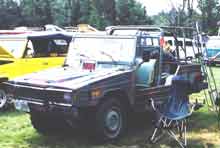From time to time, my daughter Harriet and I go to Volkswagen shows. She’s restoring her grandmother’s 1965 Beetle, and we like to see what other people are doing. It’s also an opportunity to buy parts (although, truth to tell, you could build a complete VeeDub almost from scratch out of parts bought on the internet). Summer before last we checked out the Bug-A-Fair, held at the Terryville, Connecticut, fairgrounds in August.
What to our wondering eyes should appear but the vehicle at right. We’ve known about military Volkswagens, of course, starting with the World War II Kubelwagen, its civilian grandchild the “Thing” (called by purists with its proper name Type 181), and the ultimate military VW, the amphibious Schwimmwagen. This thing is none of these. It’s an Iltis.
The Iltis is a NATO vehicle, supplied to German, Belgian and French armies in Europe. Built from 1978 to 1987, it has a 1.7 liter solid-lifter Golf engine and a modified Audi 5000 transmission with full-time drive to the rear wheels. Drive to the front can be manually engaged.
This particular Iltis is the Canadian version, built by Bombardier in Québec. Bombardier builds airplanes, subway cars, and Amtrak’s Acela Express, but perhaps the Bombardier product most familiar to you is the Ski-Doo, whose name has become almost synonymous with “snowmobile.” The Canadian Iltis differs from its European counterpart in small details like lighting, the brush guard, and a much more substantial canopy.
Why is it called “Iltis?” Iltis (Latin name Mustela putorius) is a European polecat, akin to the ferret (Mustela putorius furo). Iltis belongs to the family “Marderartigen,” group “Stinkmarder.” So now you know.
There are so many VW sites on the internet it’s hard to know where to start. One good place is Steve Mierz’s Common Gear page.

